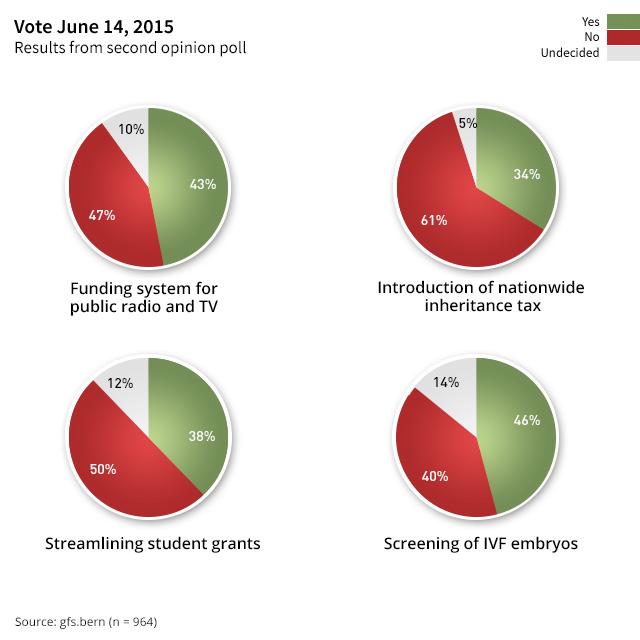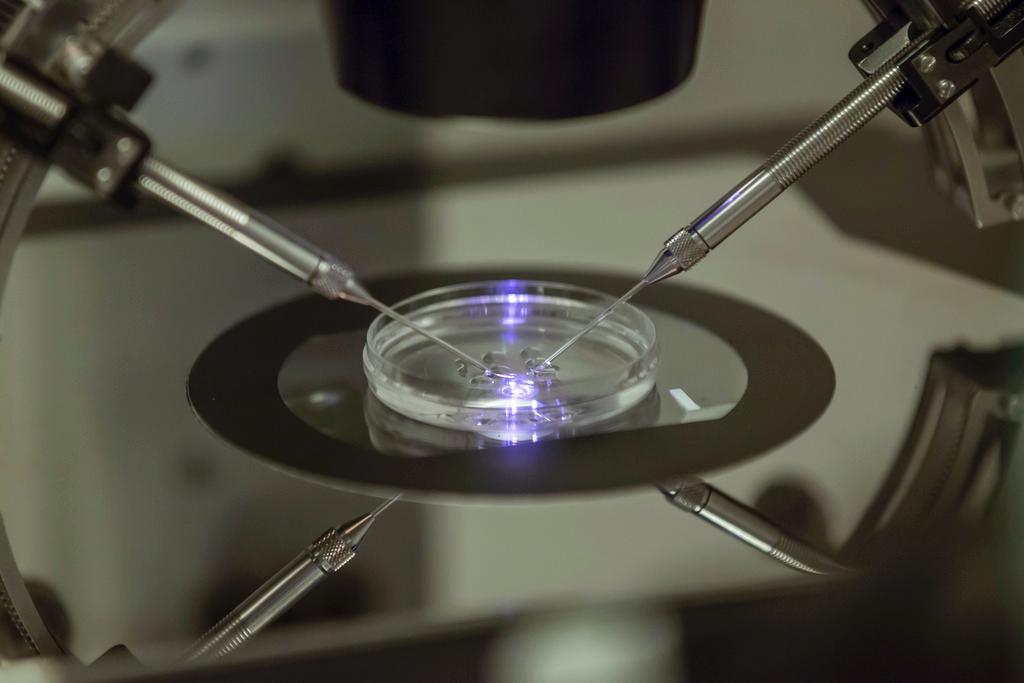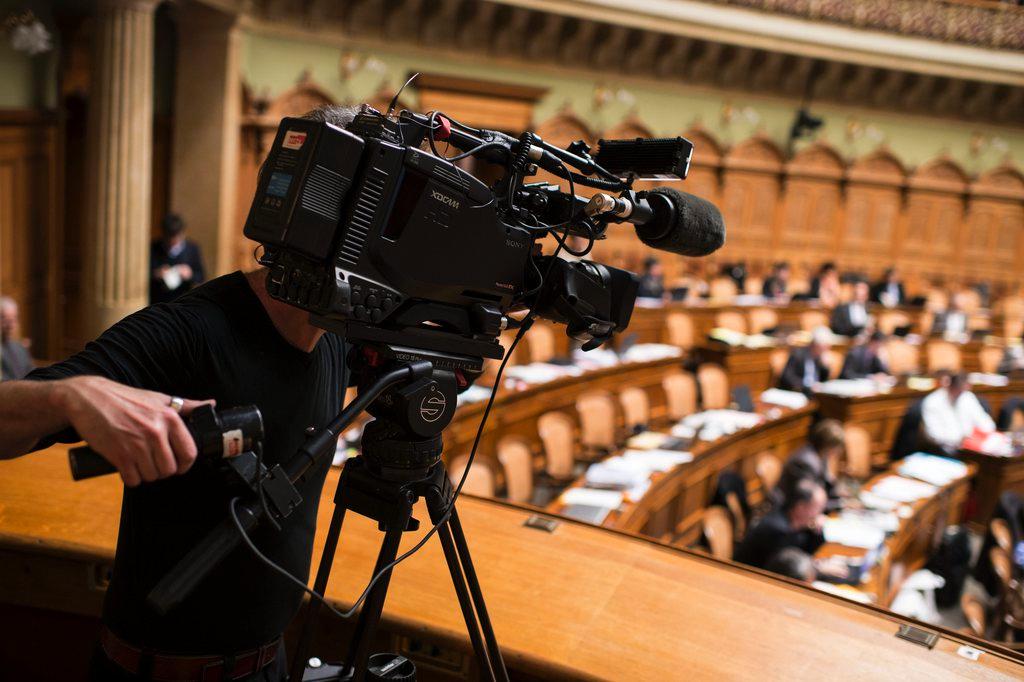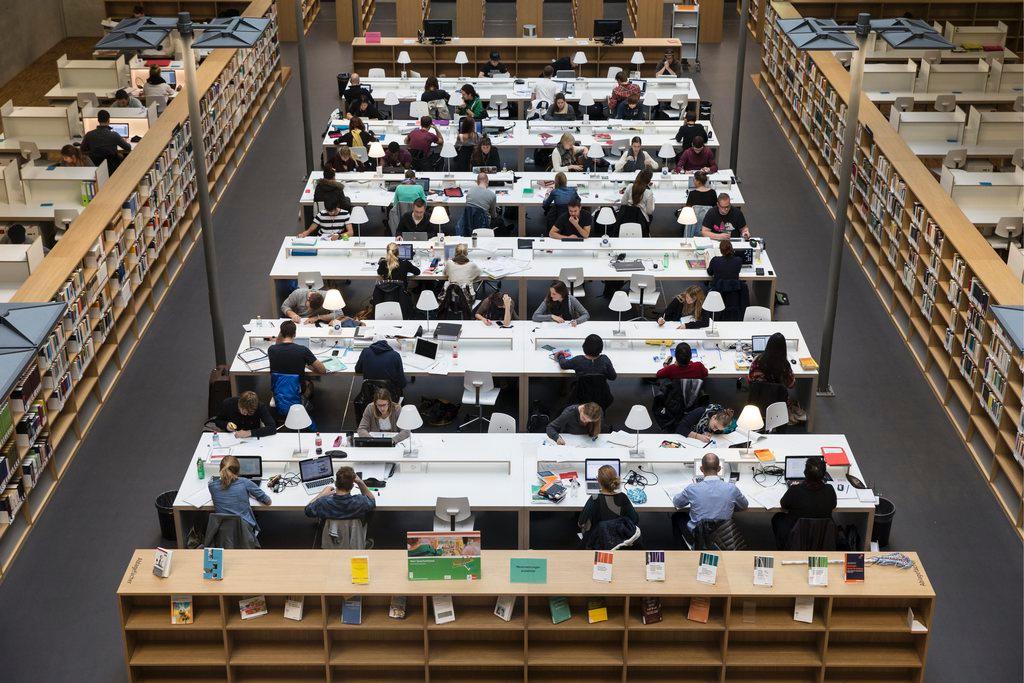No clear picture ahead of vote on TV funding

A divisive reform of the funding system for public radio and television remains controversial ahead of a nationwide vote on June 14. An opinion poll has found no clear majorities but a surprisingly high number of undecided citizens.
Voters will also have the final say that day on genetic screening of test tube embryos, as well as proposals to introduce a nationwide inheritance tax as well as student grants.
Opponents of the new radio and television funding scheme held a 4% lead over supporters in the survey carried out by the leading GfS Bern research instituteExternal link 19 days ahead of polling day on behalf of the Swiss Broadcasting Corporation (SBC), swissinfo.ch’s parent company.
Figures show a slight increase in opposition over the past four weeks of campaigning, while support dropped by 3%.
“There has been no clear trend since the first opinion poll,” said Claude Longchamp, director of the institute, on Wednesday. “The vote can go either way, but it does not necessarily mean that the result will be close.”
He said a striking number of respondents remained undecided despite a high-profile campaign that has been marked by its populist style, notably by opponents.

Most private media in the majority German-speaking part of the country also recommend a No vote, according to a report by the University of Zurich.
Meanwhile the GfS Bern pollsters found that respondents in German-speaking Switzerland lean towards rejection of the legal amendment, while those in the minority French- and Italian-speaking regions are more likely to be in favour.
However, Longchamp says there is no evidence of a major protest vote against the government and public institutions such as the SBC.
The reform, approved by parliament last year, aims to impose an annual licence fee on every household, including big companies, regardless of whether they use electronic mass media.
The GfS Bern research and polling institute interviewed 1,405 Swiss citizens from all language regions across the country for the second of two nationwide surveys ahead of the June 14 vote.
Swiss expatriates are not included in the poll.
The telephone interviews took place May 22-30.
The margin of error is 2.7%.
The survey was commissioned by the Swiss Broadcasting Corporation, swissinfo.ch’s parent company, and carried out by the leading GfS Bern research and polling institute.
Supporters say the funding scheme needs to be adapted as radio and television programmes are available for all consumers over the internet. They also argue that the fee will be lower for most citizens and that a strong public broadcaster is crucial for the cohesion of a country with important linguistic minorities.
The Association of Small- and Medium-Sized Enterprises has challenged the amended law to a nationwide vote, saying the new funding scheme is flawed. Opponents have also called for a broad debate on the definition of public service provided by SBC and the role of private media.
Embryo screening
A constitutional amendment to allow pre-implantation genetic diagnosis (PGD) in Switzerland – another issue on the ballot sheet on June 14 – is hanging in the balance.
While supporters have won ground over the past few weeks, the pollsters could not confirm definite majorities.
“There has been a slight trend towards a Yes, but rejection is also possible,” says GfS Bern political scientist Martina Imfeld.
In a first survey last month, opponents were 4% ahead, but the latest poll gives supporters a 6% lead.
Imfeld says respondents who consider themselves well informed on the issue are more likely to approve of the reform.
The main point in favour – putting Swiss legislation on a par with that in most other European countries – appears to be most convincing, while opponents warn against legalising the screening of test-tube embryos for ethical reasons.
Inheritance tax and student grants
Four separate issues feature on the ballot sheet on June 14:
A proposal, supported by the centre-left, to introduce a nationwide inheritance tax.
A constitutional amendment to allow the genetic screening of IVF embryos.
An initiative to harmonise student grants across the country.
A referendum against a parliamentary decision to reform the funding of public radio and TV.
Two people’s initiatives also coming to vote stand no realistic chance of being accepted by voters.
Pollsters found no evidence to suggest that a proposal by the centre-left to introduce a nationwide inheritance tax might win a majority at the ballot box. Support has shrunk in recent weeks to just 34%.
Imfeld says opposition has hardened with the left pitted against the right and most of the political centre.
There appears to be more support in the French-speaking part of the country, but Imfeld leaves little doubt about the outcome.A similar fate is expected for a proposal by student organisations to harmonise grants for higher education, overruling the traditional autonomy of the country’s 26 cantons.
The June 14 votes are the last nationwide ballot ahead of October’s parliamentary elections. They could give an indication of whether a recent political trend towards conservative, centre–right positions – represented notably by the Swiss People’s Party and the Radical Party – might continue, according to Longchamp.

In compliance with the JTI standards
More: SWI swissinfo.ch certified by the Journalism Trust Initiative






You can find an overview of ongoing debates with our journalists here. Please join us!
If you want to start a conversation about a topic raised in this article or want to report factual errors, email us at english@swissinfo.ch.